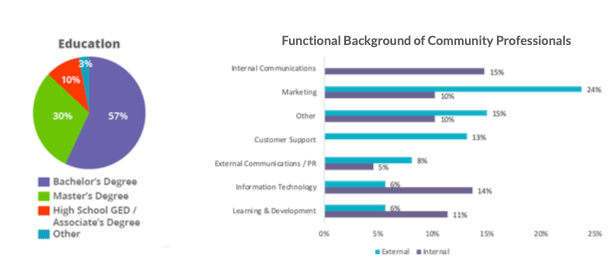What is community management?
Community management is the discipline of designing, building, and maintaining productive online communities – and it is a strategic business skill.
Because communities are one of the most effective ways to enable learning, personal growth and productivity, they play key roles in developing more fluid, collaborative and innovative organizations. Community professionals – specialists, managers, strategists and directors – are those who understand the power and dynamics of community approaches and are in the best position to help organizations transition to the future of work and deploy new generative business models.
For many years, the title ‘community manager’ has been the dominant role in the community field. As the discipline has grown, one role has become insufficient to address all the needs of community teams – both because the responsibilities (and the experience they require) are expanding and because there are disciplines within the field – like analytics, content or governance – that can be roles in their own right.
Community Management Roles
A non-exhaustive list of community management roles includes:
- community manager
- community specialist
- community operations manager
- community architect
- director of community
- community program owner
- community content manager
- community strategist
- chief community officer
- digital workplace manager
- intranet manager
- associate community manager
- VP of community
- customer experience manager
For those looking to hire community staff, they come from a wide variety of backgrounds, with the dominant fields being marketing, communications, customer support, IT, and L&D.
The average community professional has over a decade and a half of work experience, with six years of community experience. While the average community professional holds a mid-level role, community professionals range from junior positions to executive roles. This is important to note, as organizations learn how to staff a variety of community roles – and more individuals have the experience to be part of a community team than those that can manage the responsibility of being a solo community manager. As community programs mature, we expect to see even more role variation.

What skills do community managers need?
The Community Skills Framework™ categorizes the skills and responsibilities of community professionals. This research classifies community management skills in four skill families essential to the profession:
- Engagement and people skills: These skills enable relationship development, understanding motivations, and the design of social environments that reward individuals.
- Content development skills: These skills enable the creation of multi-modal content and programming designed to build engagement and drive value from multiple segments.
- Strategic and business skills: These skills include the program management, governance, advocacy, and training required for organizations to understand this new approach.
- Technical skills: These skills include an understanding of the need for and implications of platform architecture, integration, and analytics.
Overall, engagement and people skills rank highest across all job profiles. Content development skills are more important for less senior roles, and developing strategic and business skills is critical for community professionals looking to advance in their career. Technical skills are most relevant to community strategist roles.
